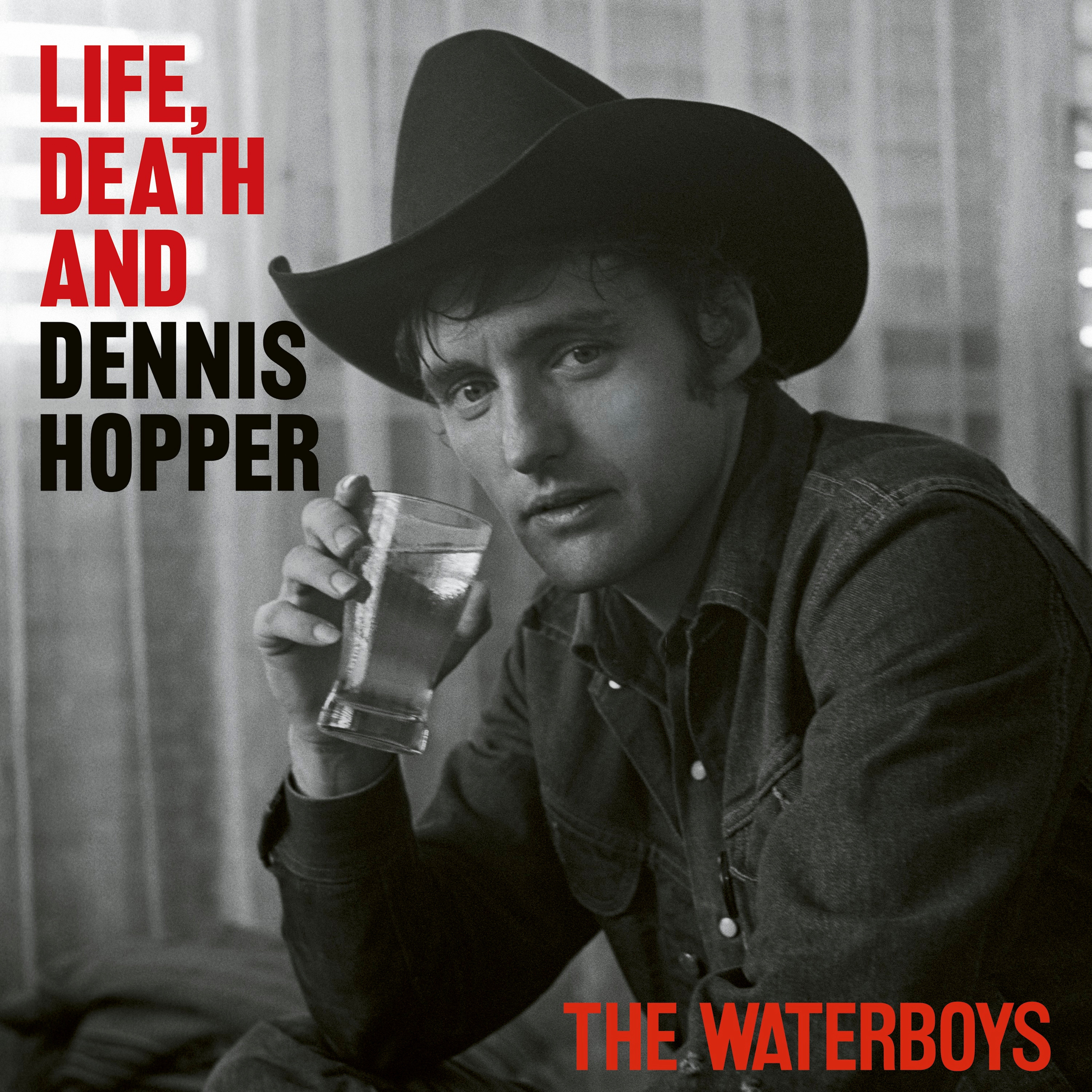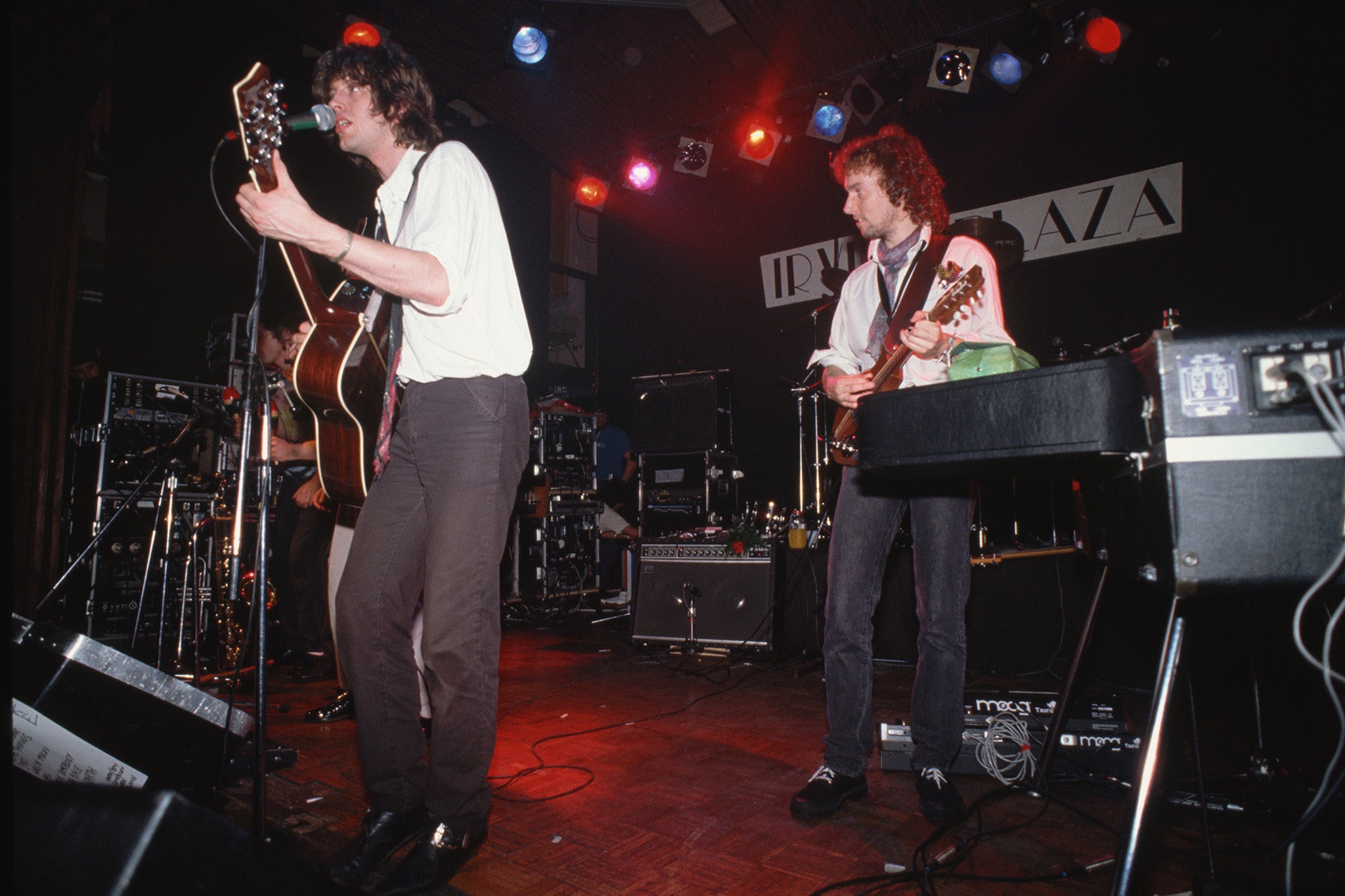
Over four decades ago, when Mike Scott started The Waterboys, the very first song they released saluted the art of somebody else. “A Girl Named Johnny”, issued in 1983, swooned over the androgynous daring of Patti Smith. In the years since, Scott has written entranced odes to an entire constellation of maverick stars, including Hank Williams (“Has Anyone Here Seen Hank?”), Elvis Presley (“I Can See Elvis”), Hendrix (“The Return of Jimi Hendrix”) and Van Morrison (“The Soul Singer”).
“It’s just a quirk in my personality,” says Scott, 66, of his favoured motif as he sits in his home studio in Dublin for a video interview. “I like writing songs about people. And these just happen to be very interesting people.”
None of them interests him more, it seems, than Dennis Hopper, the first star to inspire from Scott a wall-to-wall album tribute. Titled Life, Death and Dennis Hopper, Scott’s latest album with The Waterboys features 25 tracks that bore into every aspect of Hopper’s work, influence, and meaning. That’s no small feat considering the subject’s impact in a wealth of disciplines, including acting (in pivotal films like Rebel Without a Cause and Blue Velvet), directing (Easy Rider, which introduced a whole new level of realism to Hollywood), photography (evidenced by scores of vaunted exhibitions of his work), and art collecting (he was one of the first to recognise the subversive vision of Andy Warhol).
During our interview, Scott reflects Hopper’s character in his very look. Sporting serious glasses and a cowboy hat, he strikes the perfect middle between intellectual and outlaw.
On the album, Scott doesn’t skimp on singing about the seedier side of Hopper’s life which, during some prolonged periods in the Seventies and Eighties, was his only side, marked by drug binges extreme enough to shock a young Keith Richards and sexcapades that would make Led Zeppelin look like eunuchs. “He was reckless and did things that make you think, ‘Why the hell did he do that?’” Scott says now. “But he also had the magic touch to create things nobody could have foreseen.”
A surprising number of those things moved the culture as a whole. Scott calls Rebel Without a Cause “the big bang of youth culture”, while David Lynch’s surrealist drama Blue Velvet represented the high-water mark for art films in the Eighties. “I was very impressed by his presence at so many hinge moments in history,” Scott says. “At crucial moments, he’s always there.”

To express the breadth of Hopper’s influence took more time than usual. Scott first wrote about Hopper half a decade ago in a song named after the star, released on The Waterboys’ 2020 album Good Luck Seeker. “That was just a good fun song where every line rhymed with Hopper,” Scott says. “I thought that was that.”
He should have known better given his interest in Hopper dates back to when he was a teenager in the late Seventies. Scott’s first encounter with Hopper came from the underground comic series The Furry Freak Brothers. “In one of the books the three brothers visit a beatnik character named Groover McTuber who tells them, ‘I’m going to watch five Dennis Hopper movies tonight,’” Scott says. “That was when I realised that this Hopper bloke wasn’t just an actor. He stood for the whole counterculture.”
Scott’s interest ballooned after attending an exhibit of Hopper’s photos at London’s Royal Academy of Art a decade ago. “I was entranced by his eye,” Scott says. “The combination of how he captured the vanished world of the Sixties with his choices about when to click the shutter and how to frame the events was poignant. When his camera is pointed at his subjects, something of their soul comes out.”

The seeds of the new album began after Waterboys’ keyboardist “Brother” Paul Brown created a remix of Scott’s song “Dennis Hopper” several years ago. Shortly afterwards, the other band members approached Scott to say they’d written a series of instrumental pieces on their own. Because the frontman already had Hopper on his mind, he decided to pen like-themed words for every one of the instrumentals, expanding their work with music of his own. The songs he wrote for the album are wildly diverse, shifting quickly between movie score instrumentals, rock epics, funk tracks and spoken word pieces.
Yet, when it came time to record the songs, Scott decided he didn’t want his voice on all of them. As a Scotsman, he felt only an American singer could capture a key part of his subject’s character. “A friend once said, ‘Hopper led one of the great American lives’,” Scott says. “That shows in his sense of exploration and adventure, which led to great success and hubris before it all came crashing down. But he still managed to come back, reconfiguring himself as a sparkly-eyed elder. It’s a true hero’s journey.”
The singers Scott enlisted couldn’t be starrier, including Bruce Springsteen, who offers a dusty reading of Scott’s ode to Hopper’s self-obliteration, “Ten Years Gone,” and Fiona Apple, who sings “Letter From an Unknown Girlfriend”, a track that chronicles several horrifying incidents in his life in which he physically abused women. Daringly, the first voice we hear on the album isn’t Scott’s but that of Steve Earle, marked by his hard Americana twang. “I needed someone with an authentic plains and prairie sound,” Scott says.
The song Earle appears on, and which he helped write, is “Kansas”, named after Hopper’s birthplace. “Where a person comes from can simultaneously be who they are and everything they don’t want to be,” Earle says in a separate video interview. “You can’t do what Dennis Hopper did in Kansas. You have to go away. After he left, he became the kind of person who was mythic to everybody around me.”
Scott found another regionally specific voice in Taylor Goldsmith, frontman for the band Dawes and perhaps the most Hollywood and LA-centric songwriter since Jackson Browne. To Goldsmith, Hopper pulled off a unique feat in his Hollywood roles. “Rather than him getting lost in a role, the role got lost in him,” he said in a separate phone interview.

The song featuring Goldsmith, titled “I Can’t Believe I Made It”, concentrates on a single line – “It’s as if I made a deal with an angel” – repeated frequently enough to become a mantra. “The song lets you live with the line much longer than you would if it were just a short refrain at the end of a wordy verse,” he said. “I thought that was daring.”
As the album progresses, Scott includes a song for each of Hopper’s five wives, all of whom are still alive, including Brooke Haywood, the daughter of Hollywood royalty. It was Haywood who gave him the Nikon camera that helped turn him into a photographer. One song is devoted to Daria Halprin, who starred in the 1970 Antonioni film Zabriskie Point, and another to Mamas and Papas singer Michelle Phillips, to whom Hopper was married for an infamously fast and awful eight days. Poignantly, Scott named that track “Michelle (Always Stay)”. Phillips later described their marriage to the press as “excruciating”, but Hopper told author Peter Biskind that “seven of those days were pretty good. The eighth day was the bad one”.
According to Biskind’s reporting in his book Easy Riders, Raging Bulls (How the Sex and Drugs and Rock ‘n Roll Generation Saved Hollywood), Hopper shot off guns in the house, which terrified Phillips, whom he handcuffed at one point and insisted that she was a witch. The doomed couple originally met on the set of the 1971 Hopper-directed film The Last Movie, a financial and critical mega-bomb that the director himself later described as “one long sex and drugs orgy”.
When I started the band, I had the record deal. I was like a solo artist, but I didn’t want to work under my own name
The new album, like most Waterboys works, features a distinct configuration of players. Over their four-decade career, the band have seen a rush-hour turnstile’s cast of revolving players. Some observers have estimated that up to 50 musicians have cycled in and out of the band over their 16-album catalogue, putting them in the running for the group with the most members ever. “That was always the plan,” Scott says. “When I started the band, I had the record deal. I was like a solo artist, but I didn’t want to work under my own name.”
Likewise, he wanted the band’s music to keep changing. Their earliest albums were enriched by the varied contributions of Karl Wallinger, who went on to form the brilliant group World Party. Wallinger, who died one year ago from a stroke at 66, never got on well with Scott and the two didn’t hang out much after he left the band. Ironically, Wallinger’s World Party became an even bigger draw than The Waterboys in the world beyond the UK and Europe, a circumstance Scott puts down to his band’s lack of touring in key places like the States.
The problem, he says, was insufficient record company support during the opportune time of their classic 1985 breakthrough song “The Whole of the Moon”. That single, an instant classic later covered by scores of artists including Fiona Apple, showcased Scott’s flair for saluting visionaries with a broader viewpoint than his own. Earle says he shares Scott’s love for honouring other artists in his work. “We learn a lot about ourselves by looking into the people that came before us,” he says.

Scott’s paeans to influential artists have sometimes turned sly. In his hosannah to Elvis, he gave the King of Rock’n’Roll his revenge by imagining him slitting the throat of his villainous manager Colonel Tom Parker. “I painted him as this kind of intellectual, countercultural Elvis,” Scott says, with a laugh. “It’s the Elvis I would like to see.”
His ode to Van Morrison, meanwhile, titled “The Soul Singer,” is snarkier, capturing the Irish artist’s reputation as a rude curmudgeon who has “spent the better part of three decades brooding”. Scott says he has never heard from Morrison on the song, though, he added, “I’d be surprised if he didn’t hear it.”
Like Morrison, Scott has more than a touch of the poet in him. As always, the lyrics on his new album are quicksilver things, alight with tight alliterations and fleet verse. While his latest lyrics uphold his poetic elan, in order to properly represent Hopper they also had to embrace some crude outbursts, including a track in which he inhabits the star’s blitzed-out character from Blue Velvet by using the f-word no fewer than 29 times in a row. If such hyperboles are key to understanding Hopper, Scott also wants listeners to know that he “wasn’t just a guy who took a lot of drugs and did a lot of weird and reckless things. He was also a guy with a huge perspective and a big soul”.
“And his work is still out there,” Scott says. “It’s still there to be appreciated.”
‘Life, Death and Dennis Hopper’ will be released on 4 April, while a reissued version of the soundtrack to Hopper’s 1971 film ‘The Last Movie’ arrives on 18 April
Inside Andy Kaufman: SNL’s strange genius with an unsettling dark side
Will Smith’s rap comeback could be a sign of a career in freefall
The 25 most overrated albums, ranked
There’s a simple reason we owe Justin Bieber more respect
Chloe Moriondo: ‘I’ve been embarrassed by my online past selves but kids are cringy’







